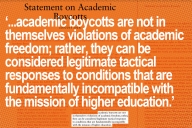You have /5 articles left.
Sign up for a free account or log in.
The University of North Carolina School of Law's Center for Civil Rights has long been a thorn in the side of the state government from its perch in Chapel Hill, as it sometimes files and joins in on lawsuits against the state.
The center focuses on cases related to race, housing and education and voting rights. Recent efforts, for example, include involvement in a suit related to accusations of state-sanctioned environmental racism occurring under an allegedly neglectful Department of Environmental Quality.
Now, the system Board of Governors is looking to defang the center, and all centers and institutes at various UNC system institutions, by banning them from filing or joining in lawsuits. Those in favor on the board -- appointed by the state legislature and noted for its political leanings and connections to the Republican-controlled body -- say it is improper for one part of the state to sue another, and that it’s outside the scope of UNC’s mission for the law school to operate the center. The center, the staff of which is privately funded, has pushed back, saying the legal education and training it provides as it pursues social-justice issues is perfectly in line with UNC’s educational mission.
While that fight plays out, however, a question of academic freedom arises, as some fear the Board of Governors is overreaching its hand in deciding the legal actions that centers and institutes at various colleges and schools at the UNC system can make.
The litigation ban would apply to any UNC system or center, but, according to local media, the Center for Civil Rights is apparently the only one that currently does any litigation. (Legal clinics would not be affected by the board’s decision.)
The American Association of University Professors, as well as Judith Welch Wegner, one of the law school’s former deans, have come out against the moves by the board, saying they represent a threat to academic freedom.
“The reason that the BOG says they have jurisdiction is because it’s called a ‘center,’ but much of what it does is really the same kind of thing that is done in the standard curriculum at law schools around the country,” Wegner said.
“The fact that the board is intervening really intrudes on faculty judgment on what the curriculum is and what is appropriate for students to get pro bono credit for,” she said. Though the board says its move is aimed at all centers and institutions, Wegner is interpreting the board’s actions as “Thou shalt not have civil rights coursework.”
Opponents of the board's move say that the move is ideological, though it carries threats to both academic freedom and the centers policy success.
"As so many have pointed out, law clinics engage in litigation, and the Center should not be held to a different standard," Sherryl Kleinman, a professor of sociology at UNC Chapel Hill and AAUP member, said in an email. "Perhaps the Center's problem is its success. Those who either don't care about the civil rights of largely low-wealth communities of people of color, or who are ideologically against the work of the Center, want to keep the Center from doing its job. The litigation ban is against the mission of the university, which is to bring services to all North Carolinians, not just the privileged few."
Requests for comment from the board went unfulfilled.
The Role of Advocacy
In higher education as a whole, concerns about university-level advocacy are not just limited to centers and institutes at law schools. Advocacy programs linked to journalism and environmental science departments have also occasionally drawn similar ire from administrators and lawmakers.
“I think that over the years there’s been a substantial concern on the part of university administrations and state legislators, generally, about programs that either teach students how to litigate or are involved in investigations that may lead to legal actions,” said Michael A. Olivas, a professor at the University of Houston Law Center.
Wegner said that the board’s move not only affected the law school’s curriculum, but also that of faculty and students on campus, such as those involved in environmental causes, who collaborate with the center.
The move to close off centers and institutions from filing suit isn’t by itself an impingement on academic freedom, Olivas said, and the context -- especially regarding conflicts of interest that might arise when one part of the state sues another -- are important.
“There are some reasonable concerns about the use of resources and conflicts of interest,” he said, although he noted that, while not familiar with UNC specifically, generally, centers and institutions are able to take care of those issues.
Rolling the center’s work into a legal clinic might guarantee more academic freedom, and potentially “insulate it as an instructional program, from trustees who might think that any such thing might be an embarrassment or a concern to a given trustee that might have ties to the industries [being sued],” Olivas said.
The possibility of starting a clinic might not be as easy as it sounds, however. The state legislature recently cut $500,000 of the law school’s appropriations, which came after a proposed $4 million spending cut.
“One wonders, since the board is now heavily populated with former legislators … I think it’s quite hard to assume that there won’t be further repercussions down the line,” Wegner said.
The News & Observer reported that five of the 12 board members are former lawmakers, and described the board as “overwhelmingly Republican.” Republicans have controlled the board elections since 2011, and the board previously shuttered UNC’s Center of Work, Poverty and Opportunity, despite similar outcry about academic freedom.
The Board votes on Aug. 1. For Wegner, the value of the Center for Civil Rights is obvious, even if its future isn’t.
“This is public service, and it’s also clearly education,” Wegner said.








